Automotive Network Scans with Scapy

Proudly presented by:


Nils Weiss M.Sc. Ph.D.¶
- Apprenticeship "Electronics Technician"
- State Certified Electrical Engineer
- B.Sc. Computer Engineering
- M.Sc. Applied Sciences: "Automotive Security"
- Ph.D. Topic: "Automotive Security"
Co-Founder of dissecto GmbH
Enrico Pozzobon M.Eng.¶
- B.Eng. Computer Engineering
- M.Eng. Telecommunications Engineering
- PhD studies "Embedded Security"
Co-Founder of dissecto GmbH
Automotive Penetration Testing with Scapy .... continued

Agenda¶
- Intro
- Automotive Protocol Stack
- Transport Protocols
- ISOTP Scanner
- DoIP / HSFZ Scanner
- Application Protocols
- OBD Scanner
- UDS
- System States
- Sessions
- Security Levels
- Custom Sessions
- Stateful Scanners
- Stateful Fuzzers
- System States
- Obsticales
Intro: Why Scapy for Automotive?
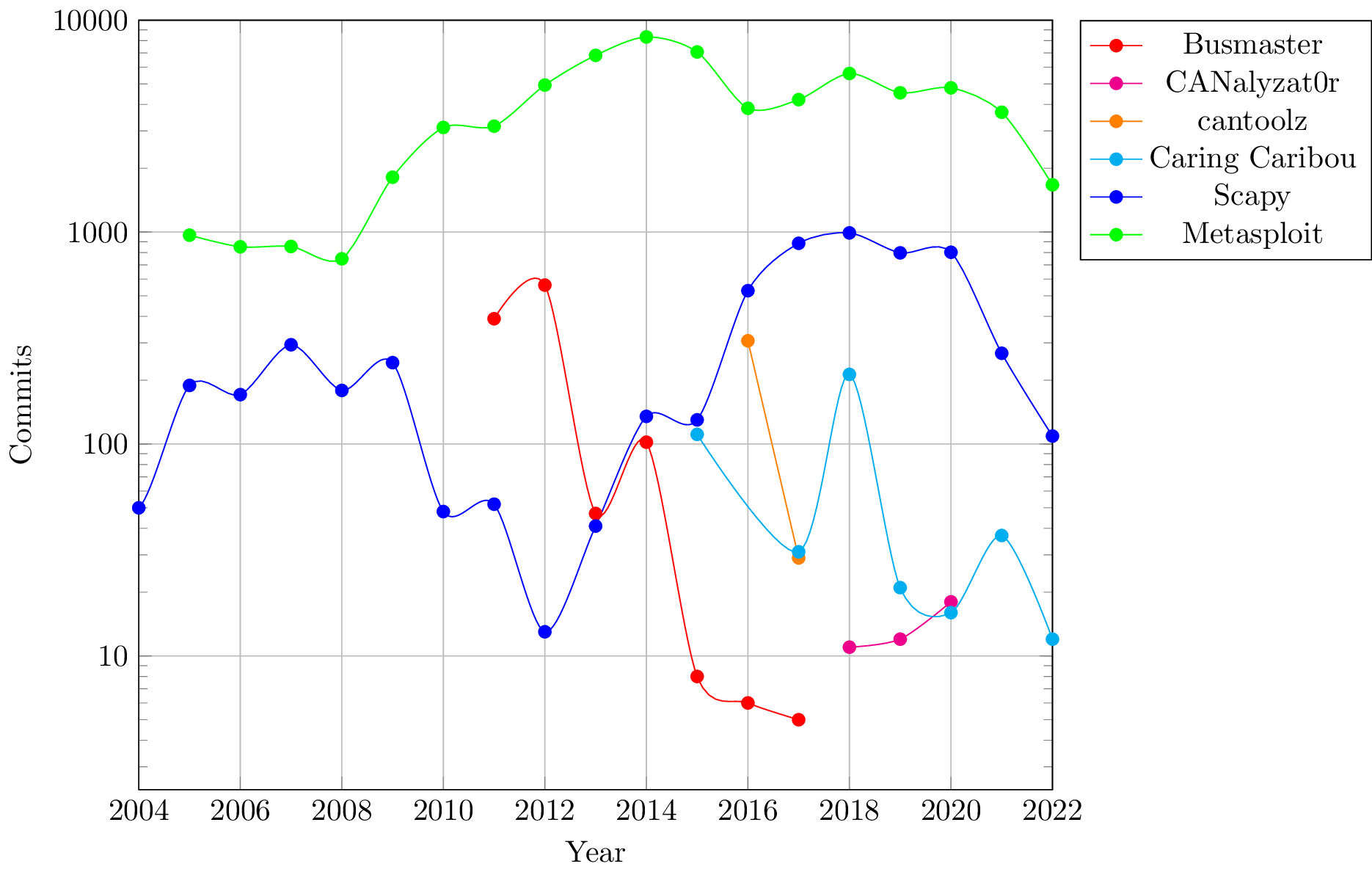
Acknowledgements¶
Author of Scapy
- Philippe Biondi
[email protected]
- Philippe Biondi
Maintainers of Scapy
- Guillaume Valadon (@guedou)
[email protected] - Gabriel Potter
[email protected] - Pierre Lalet (@pi3rre)
[email protected]
- Guillaume Valadon (@guedou)
Automotive Diagnostic Protocol Stack
CAN / CAN-FD / CAN-XL¶
- Protocol release in 1986, still not dead
- Multi-master serial bus
- Two or more nodes are required
- Two wire bus
- Differential signal
- Wired AND
- Low signal (0 Bit) is dominant
- 8 / 64 bytes payload
 CAN frame as transferred on the bus. Author: Dr. Ken Tindell
CAN frame as transferred on the bus. Author: Dr. Ken Tindell
ISO-TP (ISO 15765-2)¶
- Transport protocol for data transfer over CAN, FlexRay, LIN and MOST
- Point-to-point communication
- Up to $2^{32}-1$ byte payloads
- Flow-Control management
- No re-transmission functionality
ISO-TP fragmented communication example
Protocol Control Information (PCI)¶
- ISO-TP defines four special frame type
- Frame type 0: SF (Single Frame)
- Frame type 1: FF (First Frame)
- Frame type 2: CF (Consecutive Frame)
- Frame type 3: FC (Flow Control Frame)
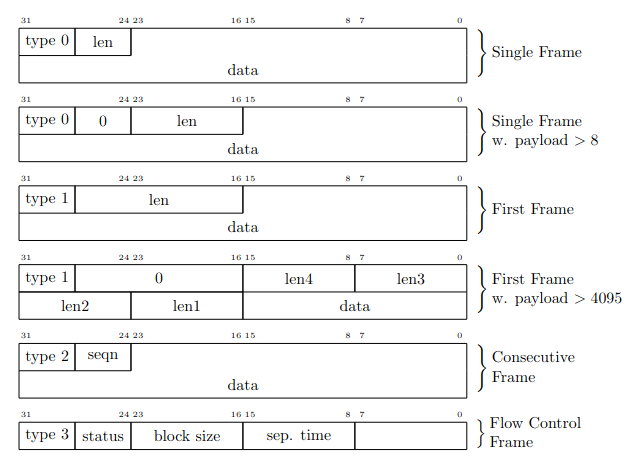
ISO-TP frame types overview
ISO-TP Scanning¶
We need to identify communication parameters:
- RX-ID
- TX-ID
- Extended Addressing (RX- and TX-ID)
- Padding
If one parameter is wrong $\Rightarrow$ no communication
Advantages:
- Detection of all ISOTP parameters, including padding
- No application layer command is triggered!
- ISOTP-Endpoints with any application layer protocol can be found
Scanning with Scapy (interactive Python shell)¶
In this example, we use vcan0 interface.
Load necessary components in Scapy¶
>>> conf.contribs['ISOTP'] = {'use-can-isotp-kernel-module': True}
>>> conf.contribs['CANSocket'] = {'use-python-can': False}
>>> load_contrib('cansocket')
>>> load_contrib('isotp')
Run scan¶
>>> socks = isotp_scan(CANSocket("vcan0"), range(0x720, 0x7F0))
Show results¶
>>> socks
[<<ISOTPNativeSocket: read/write packets at a given CAN interface using CAN_ISOTP socket > at 0x7f25c963ab50>]
Scanning with Scapy (from terminal)¶
python3 -m scapy.tools.automotive.isotpscanner --channel vcan0 --start 0 --end 100
python3 -m scapy.tools.automotive.isotpscanner --interface vector --channel 0 \
--python-can_args 'bitrate=500000, poll_interval=1' \
--start 0 --end 100HSFZ¶
- Transport layer protocol for UDS messages
- Only used by BMW
- First usages 2008
- 10Base-T in 2008
- 100Base-T appeared in 2015
- Supports (logical) addressing of ECUs
- OBD-Pin 8 is EthernetActivationLine
- Usually on port 6801
HSFZ Packet¶
>>> rfc(HSFZ)
0 1 2 3
0 1 2 3 4 5 6 7 8 9 0 1 2 3 4 5 6 7 8 9 0 1 2 3 4 5 6 7 8 9 0 1
+-+-+-+-+-+-+-+-+-+-+-+-+-+-+-+-+-+-+-+-+-+-+-+-+-+-+-+-+-+-+-+-+
| LENGTH |
+-+-+-+-+-+-+-+-+-+-+-+-+-+-+-+-+-+-+-+-+-+-+-+-+-+-+-+-+-+-+-+-+
| TYPE | SRC | DST |
+-+-+-+-+-+-+-+-+-+-+-+-+-+-+-+-+-+-+-+-+-+-+-+-+-+-+-+-+-+-+-+-+
LENGTHis payload length +SRCandDSTTYPE: 1 is message, 2 is echo/ack, 64 is errorSRC: Address of TesterDST: Address of target ECU
HSFZ scanning¶
Identification with nmap¶
$ sudo nmap -sT 192.168.17.151 -Pn -p 6801
Starting Nmap 7.70 ( https://nmap.org ) at 2021-10-05 13:18 CEST
Nmap scan report for 192.168.17.151
Host is up (0.00024s latency).
PORT STATE SERVICE
6801/tcp open acnet
Nmap done: 1 IP address (1 host up) scanned in 0.15 seconds
HSFZ Vehicle announcement message
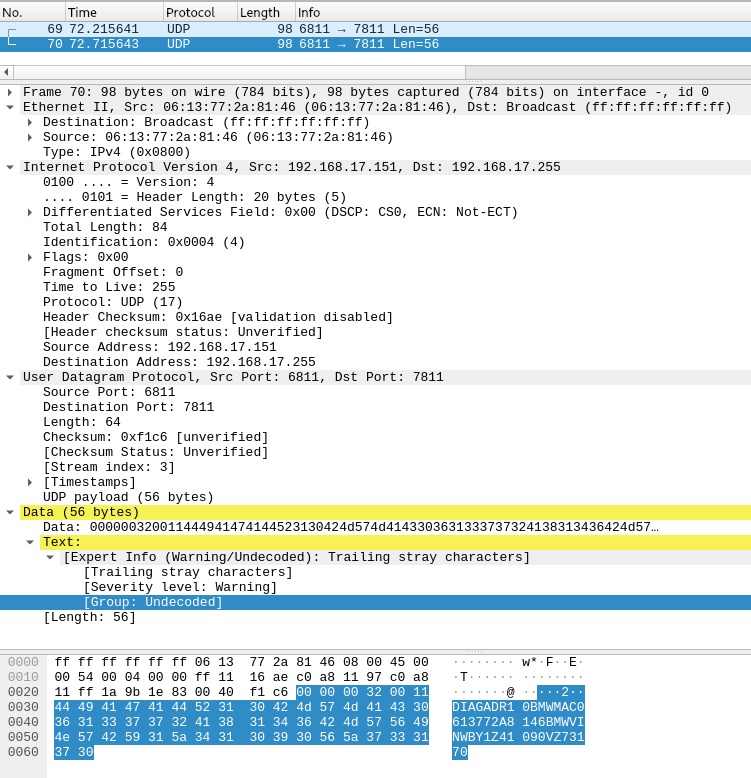
Iterate through all ECUs behind a gateway¶
>>> load_contrib("automotive.bmw.hsfz")
>>> load_contrib("automotive.uds")
>>> pkts = list()
>>> for i in range(0x100):
...: with UDS_HSFZSocket(0xf4, i, "192.168.17.151") as sock:
...: pkts += [(i, sock.sr1(UDS()/UDS_DSC(b"\x03"), timeout=0.05))]
Show results¶
>>> [x for x in pkts if x[1] is not None]
[(16,
<UDS service=DiagnosticSessionControlPositiveResponse ...>),
(64,
<UDS service=DiagnosticSessionControlPositiveResponse ...>),
(223,
<UDS service=DiagnosticSessionControlPositiveResponse ...>),
(224,
<UDS service=DiagnosticSessionControlPositiveResponse ...>),
(240,
<UDS service=NegativeResponse |<UDS_NR ...|>>)]
DoIP¶
- Dagnostic over IP
- Transport layer protocol for UDS messages
- Specified in 2012
- Features:
- vehicle announcement and vehicle discovery
- vehicle basic status information retrieval
- connection establishment, connection maintenance and vehicle gateway control
- data routing to and from the vehicle's sub-components
- error handling
- Supports (logical) addressing of ECUs
- Usually on port 13400
- Communicates over Ethernet 100 Base-TX
- Uses TCP and UDP dependent on the payload type
- Pinout on OBD-Connector is usually identical to HSFZ
- OBD-Pin 8 is EthernetActivationLine
- Fully supported by Wireshark
Identification with nmap¶
$ sudo nmap -sS 192.168.17.75 -Pn -p 13400
Starting Nmap 7.70 ( https://nmap.org ) at 2021-10-05 15:06 CEST
Nmap scan report for audi_cgw3_ecu (192.168.17.75)
Host is up (0.00013s latency).
PORT STATE SERVICE
13400/tcp open doip-data
MAC Address: 00:1A:37:BF:EE:E4 (Lear)
Nmap done: 1 IP address (1 host up) scanned in 0.96 seconds
Scan for supported tester addresses¶
>>> resps = list()
>>> for i in range(0x10000):
>>> sock = DoIPSocket("192.168.17.137", activate_routing=False)
>>> resps.append(sock.sr1(
...: DoIP(payload_type=0x5, activation_type=0, source_address=i, reserved_oem=b""),
...: verbose=False, timeout=1))
>>> sock.close()
>>>
>>> print([x.logical_address_tester for x in resps if x.routing_activation_response])
Communication¶
>>> sock = UDS_DoIPSocket6("2001:16b8:3f0e:2f00:21a:37ff:febf:edb9")
Routing activation successful! Target address set to: 0x4010
>>> pkt = UDS() / UDS_RDBI(identifiers=[0x1000])
>>> resp = sock.sr1(pkt, timeout=1)
>>> resp.show()
###[ UDS ]###
service = ReadDataByIdentifierPositiveResponse
###[ ReadDataByIdentifierPositiveResponse ]###
dataIdentifier= 0x1000
###[ Raw ]###
load = '@Tr00pers22'
Communication (IPv4)¶
>>> sock = UDS_DoIPSocket("169.254.117.238")
Routing activation successful! Target address set to: 0x4010
>>> pkt = UDS() / UDS_RDBI(identifiers=[0x1000])
>>> resp = sock.sr1(pkt, timeout=1)
>>> resp.show()
###[ UDS ]###
service = ReadDataByIdentifierPositiveResponse
###[ ReadDataByIdentifierPositiveResponse ]###
dataIdentifier= 0x1000
###[ Raw ]###
load = '@Tr00pers22'
OBD (SAE J1979)¶
- On Board Diagnostic
- Different communications ways, we only care about CAN based communication
- OBD uses ISOTP as transport layer protocol
- 10 diagnostic services can be used for data gathering
- OBD can only readdata from ECUs
- OBD standard request ID
0x7DF(0x18DB33F1), response ID0x7E8(0x18DAF111)
OBD Scanner¶
>>> load_contrib("automotive.obd.obd")
>>> load_contrib("automotive.obd.scanner")
>>> load_contrib("isotp")
>>> socket = ISOTPSocket("can0", tx_id=0x7E8, rx_id=0x7DF, basecls=OBD)
>>> s = OBD_Scanner(socket)
>>> s.scan(timeout=10)
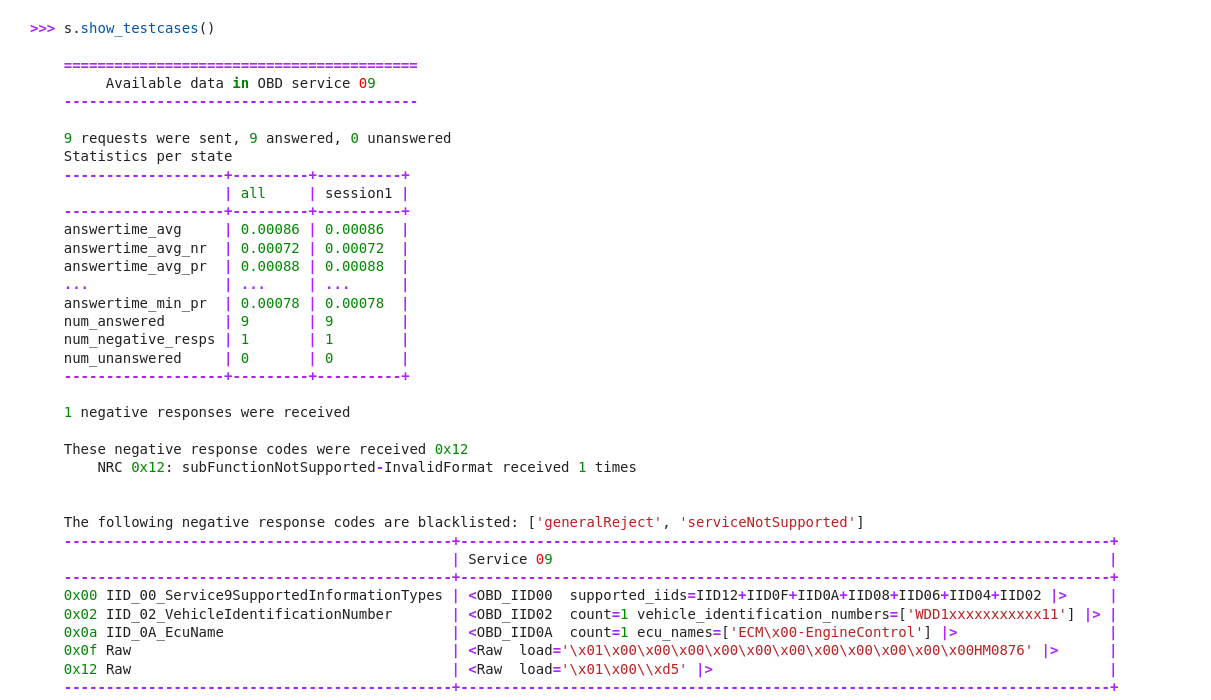
UDS¶
- Originated from KWP2000 (ISO 14230)
- Application layer protocol
- Transported by ISOTP (DoCAN) or TCP (DoIP or HSFZ)
- Use-Cases:
- Configuration of ECUs
- Execution of test routines
- Software-updates
- Information retrieval
- Reading of DTCs
- Vehicle acts as server
- Computer / Tester can be treated as client
- Communication is driven by the client
- Communication is request / response driven


Stateful UDS Scanning ... Why?


Stateful UDS Scanning ... Why?
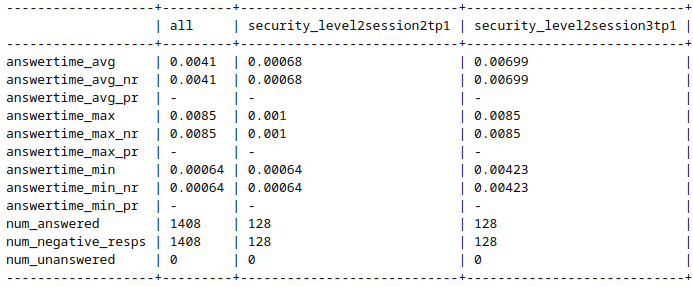
- Depending on the state, the RTT for an answer of the ECU is completly different
- Reason: Entirely different firmwares (Bootloader / Application) are executed depening on the state
- Stateful scanning is important to identify critical services and functionalities
Services that modify the system state¶
| UDS | GMLAN | ||
|---|---|---|---|
10h |
DiagnosticSessionControl | 10h |
InitiateDiagnosticOperation |
11h |
ECUReset | ||
27h |
SecurityAccess | 27h |
SecurityAccess |
28h |
CommunicationControl | 28h |
DisableNormalCommunication |
31h |
RoutineControl | ||
34h |
RequestDownload | ||
3Eh |
TesterPresent | 3Eh |
TesterPresent |
A5h |
ProgrammingMode |
Sessions¶
diagnosticSessionTypes = {
0x00: 'ISOSAEReserved',
0x01: 'defaultSession',
0x02: 'programmingSession',
0x03: 'extendedDiagnosticSession',
0x04: 'safetySystemDiagnosticSession',
0x40: 'vehicleManufacturerSpecific_40', # proprietary
0x41: 'codingSession', # proprietary
0x42: 'SWTSession', # proprietary
0x43: 'HDDDownloadSession', # proprietary
0x7F: 'ISOSAEReserved'
}
Security Access¶
- Challenge - Response Authentication Procedure
Categories of security access functions:
Simple Arithmetic Operations[1, 2]
$$key = \neg seed$$
Mathematical Operations
$$key = (seed * secret1 + secret2) \bigoplus (seed * secret3 + secret4) \bigoplus secret5$$
... continued ...
Proprietary XOR-Shift-Loops[3]
Cryptographic Operations
$$key = RSA_{sign}(MD5(seed~|~salt), {private\_key})$$
- More examples: https://github.com/jglim/UnlockECU
Software-Update-Process
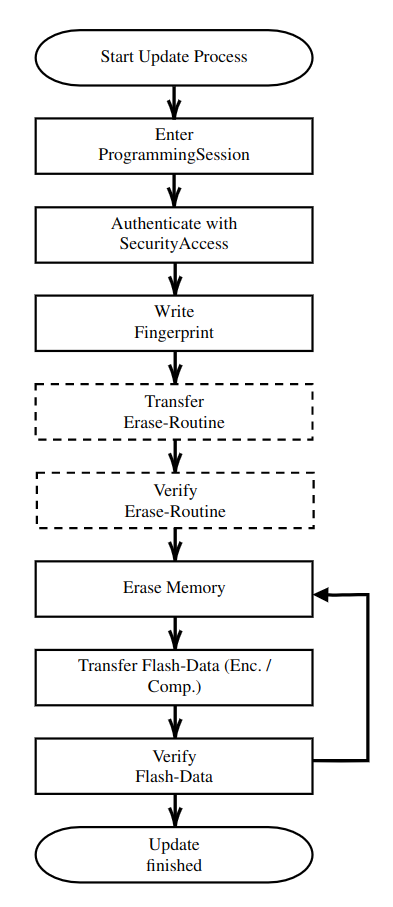
UDS_RDBI.dataIdentifiers[0xf100] = "activeSessionState"
UDS_RDBI.dataIdentifiers[0x100A] = "EnergyMode"
UDS_RDBI.dataIdentifiers[0x100e] = "ExtendedMode"
UDS_RDBI.dataIdentifiers[0xf186] = "activeDiagnosticSession"
{
# diagnosticSessionType == 3
3: { # activeSessionState
0x00: 'Bootloader',
0x81: 'ExtendedSessionEnergyModeFlash',
0x82: 'ExtendedSessionDTCOff',
0x83: 'ExtendedSessionNDCDisabled',
0x84: 'ExtendedSessionFlashModeActivated',
0x85: 'ExtendedSessionFlashExit',
0x86: 'ExtendedSessionStarted'
}
}
Custom Sessions - Entering Bootloader
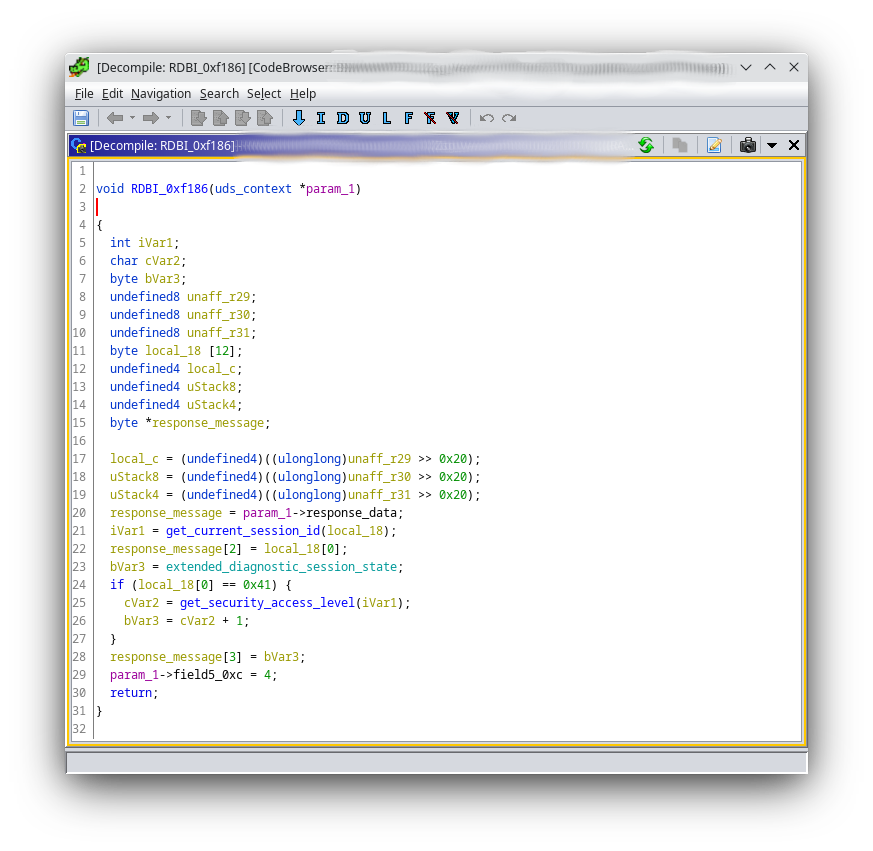
Custom Sessions - Entering Bootloader
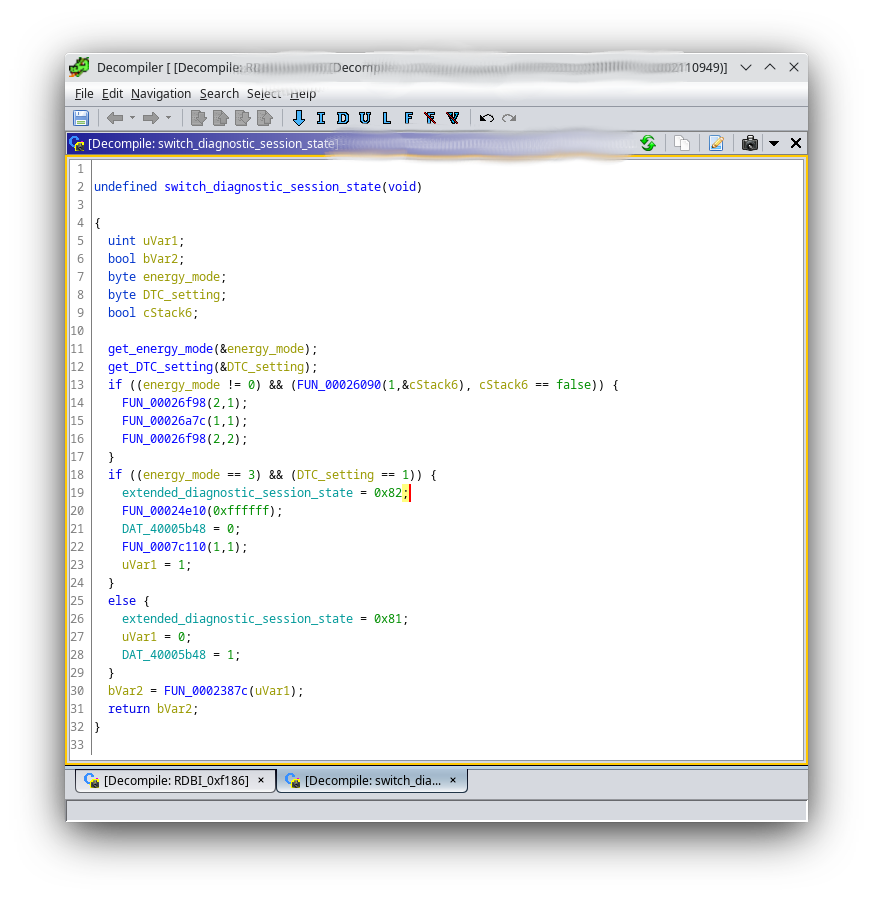
Custom Sessions - Entering Bootloader
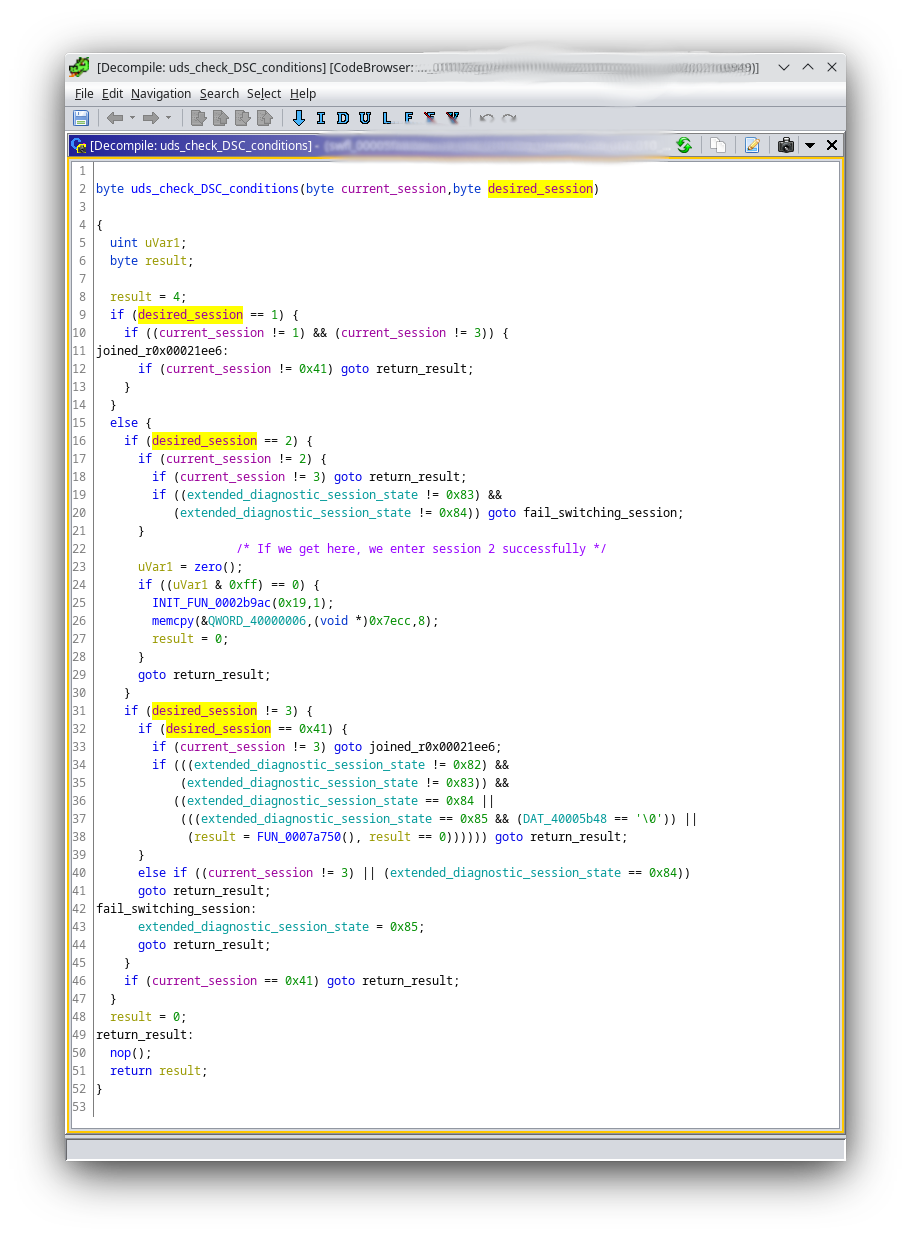
Detecting states¶
- protocol definition
- RTT for request and response
- reverse engineering, either firmwares or repair-shop testers
- $\Rightarrow$ State identifiable by request and response
- changable RDBI identifiers, ideally with correlating changes to UDS requests
- $\Rightarrow$ State identifiable by a RDBI query
Stateful Scanners in Scapy
- Request and Response $\Rightarrow$ New State / Node
- Request $\Rightarrow$ Transition Function / Edge
A system state machine $M$ is a directed graph $(S, E, \Delta)$, with the following properties:
- $S = \{s_0, s_1, \dots, s_n\}$ is a finite set of nodes, each node represents a system state.
- The state $s_0$ is defined as the default system state after the power-up of the system.
- $E = \{(v, w) \in S^2\}$ is a set of ordered pairs of nodes, called directed edges.
- $\Delta = \{\delta_0, \delta_1, \dots, \delta_k\}, \delta_k : S^2 \mapsto S, \delta_k(v, w) = z$ is a set of transitions functions for each $e \in E$.
- For each state $s_i \in S \setminus \{s_0\}$ a reset function $\delta_k \in \Delta, \delta_k(s_i, s_0) = s_0$ is given through the power cycle of the system.

Implementation¶
- The protocol (
Packet):- defines state changes / Nodes
- A
TestCase:- generates requests (
Packet) - evaluates the response and estimates a new state
- therfore, generates Edges
- generates requests (
- An
Executor:- stores Nodes and Edges in a graph
- can toogle a reset
- can modify the targets state according to a path in the graph
Implementation - Protocol¶
@EcuState.extend_pkt_with_modifier(UDS_DSCPR)
def UDS_DSCPR_modify_ecu_state(self, req, state):
# type: (Packet, Packet, EcuState) -> None
state.session = self.diagnosticSessionType # type: ignore
@EcuState.extend_pkt_with_modifier(UDS_WDBIPR)
def UDS_WDBIPR_modify_ecu_state(self, req, state):
# type: (Packet, Packet, EcuState) -> None
if self.dataIdentifier == 0xf15a:
dh = hash(req.fingerprint)
state.fingerprint = str(dh)
Implementation - TestCase¶
class FingerprintTest(UDS_Enumerator, StateGeneratingServiceEnumerator):
_description = "Fingerprint supported"
def _get_initial_requests(self, **kwargs):
# type: (Any) -> Iterable[Packet]
return [UDS() / UDS_WDBI(dataIdentifier=0xf15a) /
bytes.fromhex("16 07 26 8f 04 d2 01 00 00 10 00 00 00")]
def get_transition_function_description(self, edge):
# type: (_Edge) -> str
return "Fingerprint"
Implementation - Executor¶
with ISOTPNativeSocket(interface1, tx_id=0x6f1, rx_id=0x640, basecls=UDS) as sock:
tc = [UDS_DSCEnumerator,
UDS_TPEnumerator,
FingerprintTest]
s = UDS_Scanner(sock, reset_ecu_handler, test_cases=tc,
UDS_DSCEnumerator_kwargs={"scan_range": [1, 2, 3]})
s.scan(timeout=60)
- An
Executor(UDS_Scanner) can take an abitrary list of test cases - A reset function gives a scanner the possibility to power cycle the target
- The scan can be done over
ISOTPSockets,UDS_DoIPSocketsorUDS_HSFZSockets
Stateful Fuzzers¶
class FingerprintFuzzer(UDS_Enumerator, StateGeneratingServiceEnumerator):
_description = "Fingerprint-fuzzer"
def _get_initial_requests(self, **kwargs):
# type: (Any) -> Iterable[Packet]
return [UDS() / UDS_WDBI(dataIdentifier=0xf15a) / bytes(RandBin(13))]
def get_transition_function_description(self, edge):
# type: (_Edge) -> str
return "Fingerprint"
Results - Small Search Space

Results - Bigger Search Space

Results - Bigger Search Space

Results - Bigger Search Space



Things that affect the speed of the scan¶
- Number of enumerators
- Every combination needs to be tested, exponential!
- Time it takes to reset
- Should be optimized to the minimum possible
- Delays after session changes
- Entering some sessions requires rebooting into a new firmware
- Can lead to wrong state estimations, if delay is not respected
- Order of paths
- Depth-first could be weak to aliased states. Random order can have more luck
State estimation¶
General Problem: Lack of information.
Example: after entering a new diagnostic session, what is the current level of security access?
Specific ECUs might report state information through RDBI
Hidden state
- Example: some ECUs will only allow a programming session if energy mode is not in power-saving mode, but energy mode is not part of the UDS standard
State aliasing
- The scanner could detect two different states but they might actually be equivalent.
References¶
[1] Jürgen Dürrwang, Johannes Braun, Marcel Rumez, Reiner Kriesten, and Alexander Pretschner. Enhancement of Automotive Penetration Testing with Threat Analyses Results. SAE International Journal of Transportation Cybersecurity and Privacy, 1(2):91–112, 11 2018. doi:10.4271/11-01-02-0005.
[2] Yuefeng Du Sen Nie, Ling Liu. FREE-FALL: HACKING TESLA FROM WIRELESS TO CAN BUS. 2017. https://www.blackhat.com/docs/us-17/thursday/us-17-Nie-Free-Fall-Hacking-Tesla-From-Wireless-To-CAN-Bus-wp.pdf (accessed 2021-04-14).
[3] Jan Van den Herrewegen and Flavio D. Garcia. Beneath the Bonnet: A Breakdown of Diagnostic Security, pages 305–324. Volume 11098 of Lecture Notes in Computer Science. Springer International Publishing, 2018. URL: http://link.springer.com/10.1007/978-3-319-99073-6_15, doi:10.1007/978-3-319-99073-6_15.

